Poll Points To AstraZeneca Concerns As Europe Protests Grow
A poll unveiled Monday showed trust in AstraZeneca's coronavirus vaccine has plunged in many European countries, as the continent grapples with resurgent infections and Germany considers extending restrictions into April.
Thousands of protesters angry at Covid-19 restrictions rallied in cities across Europe over the weekend while several nations reimposed partial lockdowns.
A memo from a group of Germany's regions, seen by AFP, said the country's partial lockdown should be extended into April because of rising infection rates driven by Covid-19 variants.
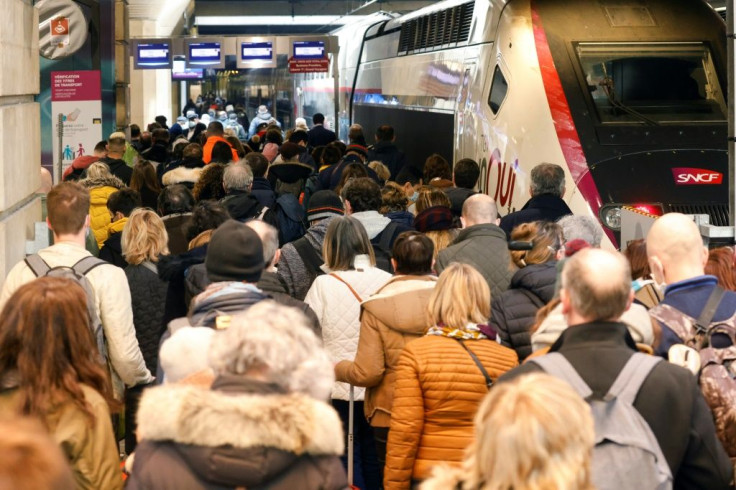
Travel needed to be cut to a minimum, with quarantines and negative tests required for those re-entering Germany, the memo warned.
The prospect of further curbs will infuriate many, including 20,000 protesters who marched against existing restrictions in the Germany city of Kassel on Saturday.
Police there used water cannon, batons and pepper spray to disperse the crowds.
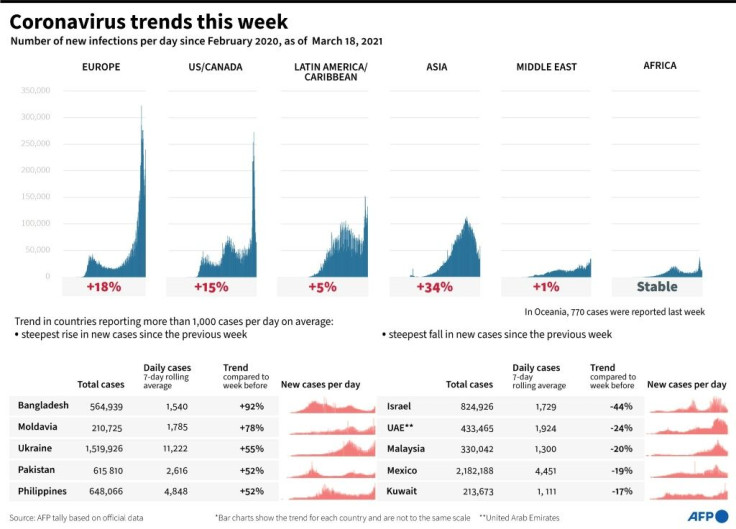
Protesters also marched in Amsterdam, Vienna, the Bulgarian capital Sofia, and Switzerland over the weekend.
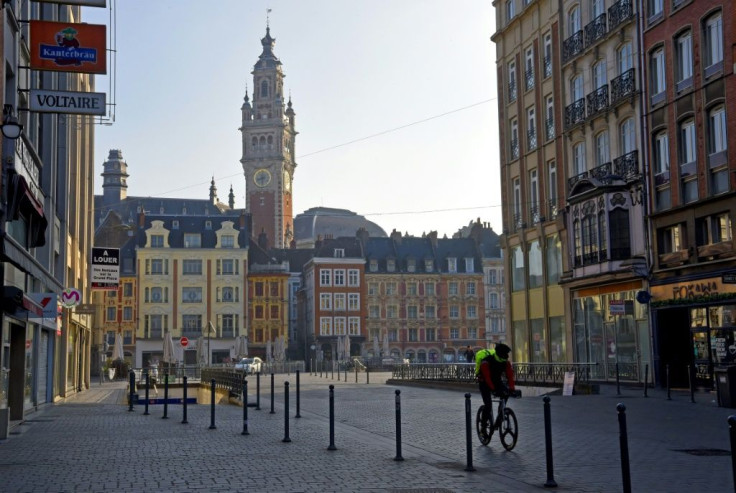
In the southern French city of Marseille, around 6,500 people took part in a carnival parade, flouting the new restrictions that came into force this weekend.
Offering glimmer of hope, the European Union's internal market commissioner, Thierry Breton, said that Europe could reach herd immunity by July 14, pointing to the expected ramping up of vaccine deliveries.
But a new survey by British pollsters YouGov showed Monday that a majority of people in the biggest European Union member states -- including Germany, France, Spain and Italy -- now view AstraZeneca's vaccine as unsafe.
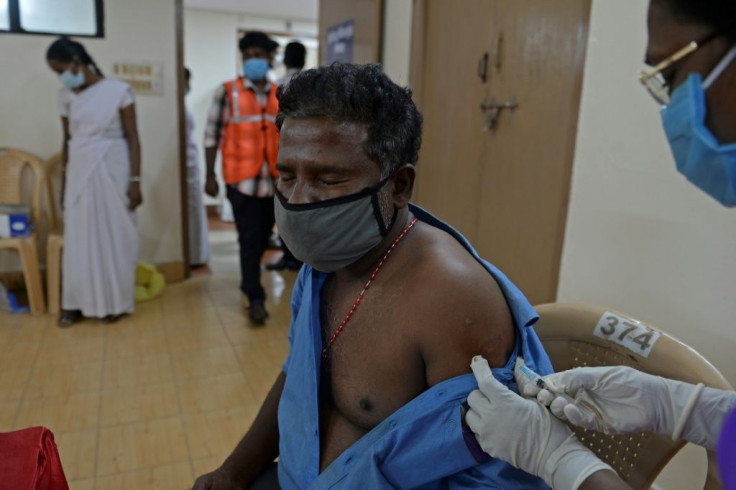
This comes after several EU countries suspended the jab's use earlier this month, pending a review by the European Medicines Agency (EMA) after dozens of isolated cases of blood clots and brain haemorrhages.
However, views of the Anglo-Swedish pharma giant's jab remain overwhelmingly positive in Britain, where two-thirds of respondents said it is safe.
Britain on Sunday warned the EU over its threat to halt exports of AstraZeneca's vaccines, in a row that has heightened post-Brexit tensions between London and Brussels.

AstraZeneca has delivered only 30 percent of the 90 million doses it promised the EU for the first quarter, infuriating European leaders and complicating the continent's already struggling rollout.
Brussels has accused London of operating its own de facto export ban to achieve its vaccine success, a claim furiously denied by the British government.
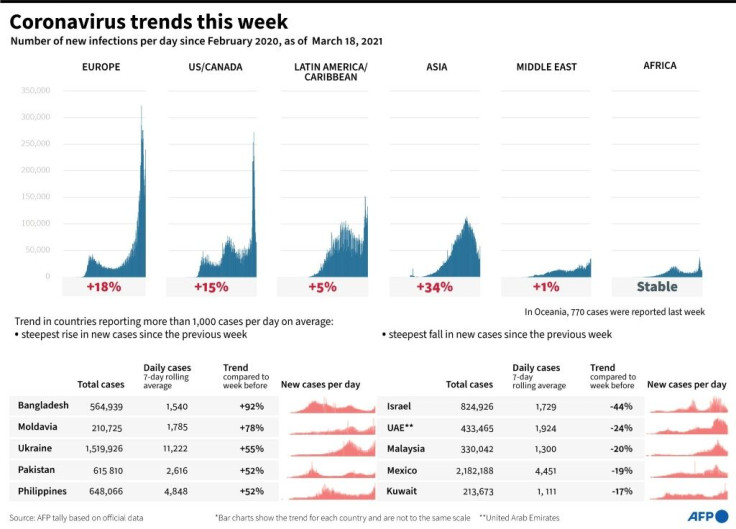
The coronavirus, which has killed more than 2.7 million people, has been spreading faster recently, with new infections up globally by 14 percent in the last week, according to AFP data.
The EU said Sunday that a summit scheduled for Thursday and Friday in Brussels will not be held in person because of the accelerating third wave of the coronavirus in Europe.
Residents in Poland, parts of France, and Ukraine's capital Kiev were the latest to face fresh curbs from Saturday.
Restrictions were also returning in parts of Asia.
Churches in the Philippines' capital Manila will be closed, eating inside restaurants banned and leisure travel outside the city curbed under new rules.
And in northern India, the government warned that a huge Hindu religious gathering could turn into a superspreader event, calling for increased testing of the large crowds of -- mostly maskless -- pilgrims.
The annual Kumbh Mela festival, shortened from three months to 30 days, attracted more than three million pilgrims in one day earlier this month.
US authorities have, meanwhile, imposed a state of emergency and a curfew in Miami Beach, Florida, to deal with crowds partying during spring break.
With approximately 13 percent of US residents vaccinated, many seemed convinced that the pandemic is now under control in the world's worst-hit nation.
"Just go get your vaccine y'all, so that you could come out here and have a good time like us because we vaccinated, baby," Jalen Rob, a student from Texas, told AFP.
But health expert Anthony Fauci stressed that people still needed to remain cautious -- or there may be more spikes in infections.
For the first time, the US administered more than three million doses of Covid-19 vaccine for two consecutive days, according to official figures published Sunday.
Hopes of ending the pandemic have been boosted with rollouts starting in some poorer parts of the world as well, including the Palestinian Territories, which was due to start giving out shots on Sunday.
Brazil said Sunday it was lifting its requirement for local authorities to reserve half their coronavirus vaccine stockpiles for second doses, seeking to accelerate its lagging immunization campaign.
And South Africa's health minister said the government has sold a million doses of the AstraZeneca coronavirus vaccine for distribution in 14 fellow African nations.
The offer, confirmed by UN and diplomatic sources, comes as Kenya battles a severe third wave of the virus and last week recorded its highest single-day death toll since the pandemic began.
© Copyright AFP {{Year}}. All rights reserved.





















